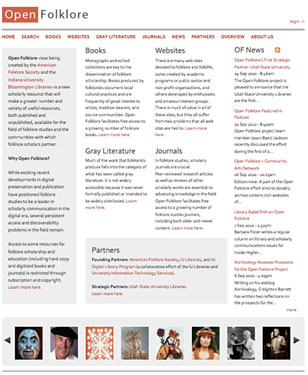Last modified: Thursday, January 27, 2011
Open Folklore project honored for outstanding collaboration between IU Bloomington Libraries, AFS
FOR IMMEDIATE RELEASE
Jan. 27, 2011
BLOOMINGTON, Ind. -- The Open Folklore project, a collaborative effort between the Indiana University Bloomington Libraries and the American Folklore Society, is the recipient of the 2011 Outstanding Collaboration Citation. The honor comes from the Association of Library Collections and Technical Services within the American Library Association.

The award recognizes and encourages collaborative problem-solving efforts in the areas of acquisition, access, management, preservation or archiving of library materials, as well as a demonstrated benefit from actions, services or products that improve and assist with the management of library collections.
Open Folklore debuted in October 2010 to provide open online access to many useful -- but heretofore difficult to access -- research materials in the field of folklore studies, including books, journals, "gray literature" (unpublished) and web sites.
"Open Folklore is extraordinary in its vision and its promise. A true example of the spectacular things that can be achieved together but which are entirely impossible alone," said Julie Bobay, Associate Dean of IU Bloomington Libraries.
"Ultimately, Open Folklore will become a multifaceted resource, combining digitization and digital preservation of data, publications, educational materials and scholarship in folklore; promoting open access to these materials and providing an online search tool to enhance discoverability of relevant, reliable resources for folklore studies," said Kurt Dewhurst, president of the American Folklore Society.
"As it grows, Open Folklore will provide a vehicle -- guided by scholars -- for libraries to re-envision our traditional library services centered on collections -- selection, acquisition, describing, curating and providing access to a wide range of materials, published or not," said Brenda Johnson, Dean of IU Bloomington Libraries. "The progress of this experiment will, in a very real way, illuminate the path academic libraries must take in supporting collection development in the digital age."
Primarily, Open Folklore was developed so quickly and productively because of the close match between the collection development and scholarly communications priorities of the IU Libraries and the American Folklore Society, Dewhurst said.
Barbara Fister of Inside Higher Ed blog Library Babel Fish, said the project is drawing "a terrific map for societies unsure of how to proceed" with open access.
"Partnering with Indiana University Libraries, the American Folklore Society is identifying where their literature is and how much of it is accessible, bringing attention to existing and potential open access journals, asking rights holders if material can be set free, digitizing gray literature so it will be preserved . . . these folks are sharp," Fister said. "And they're doing what scholarly societies should do: promoting the field and sharing its collective knowledge for the greater good."
"As a librarian deeply involved in building digital collections of the future, I view Open Folklore as a stunning example of the value of, and opportunities presented by, new developments in scholarly communication," said John Wilkin, executive director of HathiTrust Digital Library.
The award will be presented at the Association of Library Collections and Technical Services Awards Ceremony at the Annual Conference in June 2011.